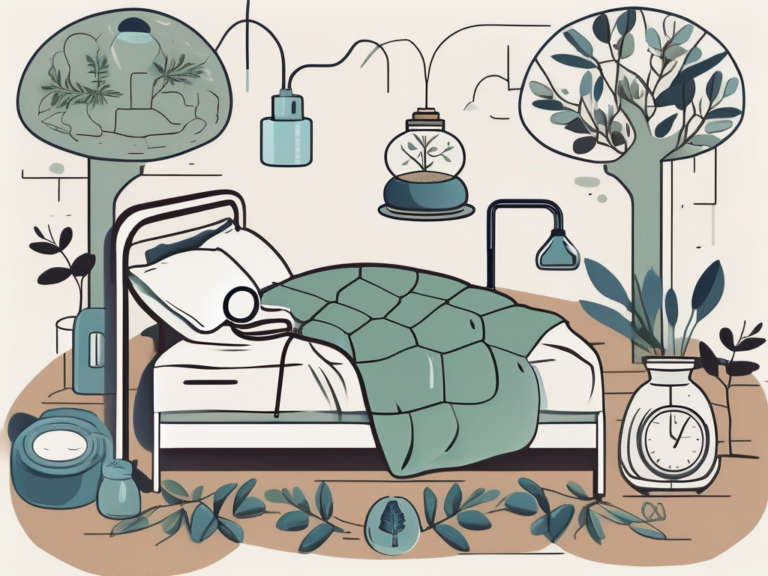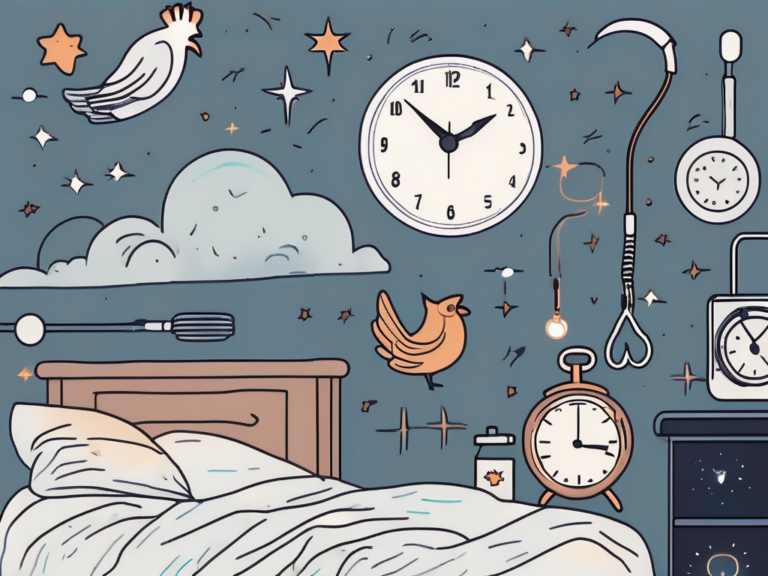Tips for When You Can’t Sleep
Having trouble falling asleep or staying asleep? You’re not alone. Many individuals struggle with occasional or chronic insomnia, a sleep disorder that affects their ability to get the rest their bodies and minds need. In this article, we will explore some tips and techniques to help you overcome sleepless nights and improve your overall sleep quality.
Understanding Insomnia
Insomnia is a sleep disorder characterized by difficulty falling asleep, staying asleep, or both. It can have various underlying causes and can significantly impact your quality of life. To effectively address insomnia, it is essential to understand the science behind sleep and the common causes of this sleep disorder.
The Science Behind Sleep
Sleep is a complex process that involves several stages, including light sleep, deep sleep, and rapid eye movement (REM) sleep. These stages repeat in cycles throughout the night. When we sleep, our bodies undergo important restorative processes, such as tissue repair and memory consolidation.
During light sleep, our brain waves slow down, and our muscles relax. This is the stage where we are easily awakened. Deep sleep, on the other hand, is characterized by slower brain waves and a decrease in heart rate and body temperature. It is during this stage that our body repairs and regenerates tissues, strengthens the immune system, and releases growth hormones.
Rapid eye movement (REM) sleep is the stage where most dreaming occurs. Our brain activity increases, and our eyes move rapidly from side to side. This stage is essential for cognitive function and emotional well-being, as it helps process and consolidate memories.
The regulation of sleep is influenced by various factors, including our internal body clock, known as the circadian rhythm, and external cues such as light and darkness. Disruptions in these factors can disturb the natural sleep-wake cycle and contribute to insomnia.
Common Causes of Insomnia
Insomnia can be caused by multiple factors, both physical and psychological. Some common causes include:
- Stress and anxiety: Mental and emotional stress can make it difficult to relax and fall asleep.
- Depression: Individuals with depression often experience changes in sleep patterns, including insomnia.
- Chronic pain: Conditions such as arthritis or fibromyalgia can cause discomfort that disrupts sleep.
- Medical conditions: Certain medical conditions, such as sleep apnea or restless leg syndrome, can interfere with sleep.
- Medications: Some medications, such as certain antidepressants or stimulants, can affect sleep quality.
- Unhealthy sleep habits: Irregular sleep schedules, excessive caffeine or alcohol consumption, and using electronic devices before bed can all contribute to insomnia.
Identifying the underlying cause of your insomnia is crucial in developing an effective treatment plan. By addressing the specific factors contributing to your sleep difficulties, you can improve your sleep quality and overall well-being.
Lifestyle Changes to Improve Sleep
Fortunately, there are several lifestyle changes you can make to improve your sleep quality. By adopting healthy habits, you can create a sleep-friendly environment and enhance your chances of getting a restful night’s sleep.
Getting a good night’s sleep is not just about the number of hours you spend in bed; it’s also about the quality of sleep you get. Let’s dive deeper into two key areas that can have a significant impact on your sleep: diet and exercise, and creating a sleep-friendly environment.
Diet and Exercise
Your diet and level of physical activity can significantly impact your sleep. Avoid consuming large meals close to bedtime, as this can cause discomfort and make it harder to fall asleep. Instead, opt for light snacks if you need something before bed.
But it’s not just about what you eat; it’s also about when you eat. Research suggests that having a consistent eating schedule can help regulate your body’s internal clock, making it easier for you to fall asleep and wake up at the desired times. So, try to establish regular meal times and avoid late-night snacking.
Now, let’s talk about exercise. Adding regular physical activity to your routine can improve your sleep quality. However, timing is key. Exercise earlier in the day, as working out too close to bedtime can actually stimulate the body and make it difficult to wind down. Aim for at least 30 minutes of moderate-intensity exercise most days of the week for optimal sleep benefits.
Creating a Sleep-Friendly Environment
The environment in which you sleep can greatly influence the quality of your sleep. Make your bedroom a sanctuary for relaxation and sleep. Keep the room cool, quiet, and dark. Consider using earplugs, eye masks, or white noise machines if necessary.
But what about the ambiance? Creating a soothing atmosphere can help signal to your body that it’s time to wind down. Consider using calming scents like lavender or chamomile, either through essential oils or scented candles. These scents have been shown to promote relaxation and improve sleep quality.
Avoid using electronic devices, such as smartphones or tablets, in bed. The blue light emitted by these devices can interfere with your natural sleep patterns. Instead, engage in calming activities like reading a book or taking a warm bath before bed. These activities can help you unwind and prepare your mind and body for a restful night’s sleep.
By making these lifestyle changes, you can create an environment that supports healthy sleep habits. Remember, improving sleep quality is a journey, and it may take time to find what works best for you. So, be patient and consistent with your efforts, and soon you’ll be on your way to enjoying better sleep and waking up refreshed each morning.
Relaxation Techniques for Better Sleep
When you’re struggling to fall asleep, practicing relaxation techniques can help calm your mind and prepare your body for sleep. Here are two effective techniques:
Mindfulness and Meditation
Mindfulness and meditation involve focusing your attention and becoming fully present in the moment. By practicing mindfulness or meditation exercises before bed, you can alleviate stress and promote relaxation. There are various guided meditations and mindfulness apps available to assist you in establishing a bedtime routine.
Imagine yourself in a peaceful garden, surrounded by vibrant flowers and the gentle sound of a trickling stream. As you close your eyes, you take a deep breath in, allowing the scent of blooming roses to fill your senses. With each exhale, you release any tension or worries that may be lingering in your mind. The warmth of the sun on your skin brings a sense of tranquility, and you feel a deep sense of calm washing over you.
As you continue your mindfulness practice, you become aware of the sensations in your body. You notice the gentle rise and fall of your chest with each breath, and the subtle tingling in your fingertips. With each passing moment, you feel more grounded and connected to the present moment. Your mind becomes still, free from the racing thoughts that often keep you awake at night.
Breathing Exercises for Sleep
Deep breathing exercises can be done lying in bed to relax your body and mind. One simple technique is diaphragmatic breathing, also known as belly breathing. Lie on your back, place one hand on your chest and the other on your abdomen. Take slow, deep breaths, allowing your abdomen to rise and fall with each breath. This technique helps slow your heart rate and promote a state of relaxation.
As you lie in bed, ready to embark on a restful night’s sleep, you take a moment to focus on your breath. Inhaling deeply, you feel your abdomen expand like a balloon, filling with fresh, revitalizing air. As you exhale, you release any tension or tightness in your muscles, allowing them to melt into the comfort of your bed.
You imagine yourself on a serene beach, the rhythmic sound of waves crashing against the shore lulling you into a state of tranquility. With each breath, you feel the ebb and flow of the ocean within you, mirroring the rise and fall of your chest. The cool, salty breeze brushes against your skin, carrying away any lingering stress or worries.
As you continue your deep breathing, you feel a sense of peace and relaxation wash over you. Your body becomes heavy, sinking deeper into the mattress, as your mind becomes still and calm. The cares of the day fade away, replaced by a sense of serenity and a gentle invitation to sleep.
Overcoming Nighttime Anxiety
Nighttime anxiety can often contribute to insomnia, making it challenging to quiet your mind and fall asleep. Fortunately, there are techniques you can use to manage anxiety at bedtime.
One effective technique for managing nighttime anxiety is cognitive-behavioral therapy (CBT). CBT focuses on identifying and challenging negative thoughts or beliefs that contribute to anxiety. By reevaluating and reframing your thoughts, you can reduce anxiety and create a more positive mindset. For example, if you find yourself thinking, “I’ll never be able to fall asleep tonight,” you can challenge that thought by reminding yourself of times when you were able to fall asleep easily. This can help shift your perspective and reduce anxiety.
In addition to challenging negative thoughts, another helpful cognitive-behavioral technique is scheduling worry time during the day. This involves setting aside a specific time, maybe 15-30 minutes, to address any concerns or worries before bedtime. By giving yourself dedicated time to think about and problem-solve any issues, you can help prevent intrusive thoughts from disrupting your sleep. This can be particularly helpful if you find yourself lying in bed, unable to stop your mind from racing with worries.
Stress Management Strategies
Developing effective stress management strategies can significantly reduce nighttime anxiety. Engaging in relaxation activities such as yoga, deep breathing, or progressive muscle relaxation before bed can help calm your mind and prepare your body for sleep. These activities can activate the body’s relaxation response, which counteracts the stress response and promotes a sense of calm. Additionally, practicing good time management and prioritizing self-care activities can reduce overall stress levels and contribute to better sleep.
Another stress management strategy that can be helpful is journaling. Writing down your thoughts and feelings before bed can help you process and release any pent-up emotions, reducing anxiety. You can also use your journal to create a gratitude list, where you write down things you are grateful for each day. Focusing on the positive aspects of your life can help shift your mindset and reduce anxiety.
In conclusion, managing nighttime anxiety is crucial for improving sleep quality. By utilizing cognitive-behavioral techniques and stress management strategies, you can create a more peaceful and restful bedtime routine. Remember, it may take time and practice to find the techniques that work best for you, so be patient and gentle with yourself as you navigate this journey towards better sleep.
When to Seek Professional Help
If your insomnia persists despite trying various self-help techniques, it may be time to seek professional help. Chronic insomnia can have a significant impact on your life, affecting your mood, energy levels, and overall well-being. It is important to recognize the signs of chronic insomnia and explore treatment options.
Recognizing Chronic Insomnia
Chronic insomnia is defined as difficulty falling asleep, staying asleep, or having non-restorative sleep that lasts for at least three nights per week for three months or longer. If you experience these symptoms and they significantly impair your daytime functioning, it is vital to consult a healthcare professional for a comprehensive evaluation.
Treatment Options for Insomnia
There are various treatment options available for chronic insomnia. Your healthcare provider may recommend cognitive-behavioral therapy for insomnia (CBT-I), a type of therapy that focuses on changing ingrained sleep habits and promoting healthy sleep patterns. In some cases, medications, such as sedative-hypnotics, may be prescribed, but these should only be used under professional guidance and for a limited period.
Additionally, alternative therapies have shown promising results in improving sleep quality for individuals with chronic insomnia. For example, acupuncture, a traditional Chinese medicine practice, involves the insertion of thin needles into specific points on the body to promote relaxation and balance energy flow. Some studies have suggested that acupuncture may help regulate sleep patterns and alleviate insomnia symptoms.
Furthermore, lifestyle modifications can play a crucial role in managing chronic insomnia. Establishing a consistent sleep schedule, creating a relaxing bedtime routine, and optimizing your sleep environment can contribute to better sleep quality. It is also important to address any underlying factors that may be contributing to your insomnia, such as stress, anxiety, or certain medical conditions.
In conclusion, improving your sleep quality and overcoming insomnia require making lifestyle changes, adopting relaxation techniques, and seeking professional help, if necessary. By understanding the science behind sleep, addressing common causes of insomnia, and implementing healthy sleep habits, you can take control of your sleep and wake up feeling refreshed and rejuvenated.






